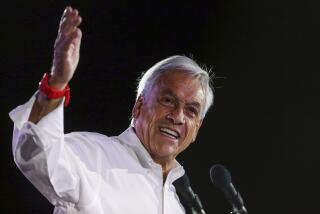Chile Reaches Agreement on Credit Package
SANTIAGO, Chile — President Augusto Pinochet of Chile has strengthened the financial base of his authoritarian regime with a $7.8-billion package of loans from foreign banks.
The deal rescued the government from possible default in the servicing of its $20-billion foreign debt. It also supplies new money needed to revive the Chilean economy, now in the fourth year of recession.
“The effect of this is to underwrite Pinochet for the next three years without any sign of a political opening toward a return to democracy or even basic human rights,” Andreas Zaldivar, an opposition leader, said. Zaldivar is president of the Christian Democratic International, representing more than 80 parties worldwide.
Midway Through Term
Pinochet, an army general who led the military overthrow of the late President Salvador Allende’s Marxist administration in 1973, is midway through an eight-year presidential term that ends in 1989. Under the present constitution, he could be reelected for another eight-year term by the military junta.
Opposition political parties remain legally banned. Pinochet last week repeated his attacks on “the corrupt old politicians” who lead the democratic parties. He says that Chile is at war with “international Marxism,” and the security forces are trying to repress growing armed terrorism here.
The loans represent a gamble by the banks that with new money the Chilean economy, which plunged into debt after a short boom in 1979 to 1981, can generate enough foreign earnings to pay its foreign obligations. The gamble depends, in part, on Chile’s political stability.
A steering committee for 300 foreign private creditor banks agreed last Friday in New York to provide $4.45 billion in debt refinancing and $935 million in new money for this year and next.
This will be followed by a $750-million, three-year “extended facility” from the International Monetary Fund, which has approved a Chilean austerity program.
The World Bank will provide a $400-million “structural adjustment” loan to finance imports for investments that lead to new exports and will guarantee “co-financing” from private banks of $1 billion.
The United States government through the Commodity Credit Corporation and the Export-Import Bank will also refinance about $170 million in Chilean debt. Foreign banking sources involved in the lengthy negotiations on the new package in Washington and New York said that the highly favorable refinancing scheme, covering all major debt through 1987, received the political approval of the Reagan Administration.
Guarantees From World Bank
This was expressed in U.S. Treasury approval for the guarantees from the World Bank for new private bank credits, clearing the way for approval by the bank steering committee of $4.5 billion in refinancing over 12 years at slightly reduced interest rates.
The Pinochet regime, now in its 11th year, obtained this vital international aid for its shaky economy without having to make any significant political concessions.
The Reagan Administration held up U.S. approval of the debt refinancing operation for nearly two months, insisting on termination of the state of siege, a form of martial law, imposed by the Pinochet regime last November when there was an outbreak of terrorism.
Two weeks ago, the state of siege was replaced here by a softer “state of emergency” that allows opposition publications, closed eight months ago, to circulate. But any news involving internal armed resistance or the security forces continues to be subject to censorship. People can be arrested without court order and confined without trial in remote villages or exiled.
The loans rescue Chile from a possible default on servicing of its $20-billion foreign debt, on which no principal or interest payments have been made for six months. Chile’s finances have been damaged by a severe price decline for copper, the main export.
Under the stabilization agreement signed with the IMF, Chile devalued the peso nearly 9% last Friday to boost exports. It had projected a trade surplus this year of $1 billion, but the current monthly rate of exports would produce a trade surplus of only $700 million in 1985.
Without the new money under the loan package, Chile would be unable to cover an expected balance-of-payments deficit this year of over $1 billion.
More to Read
Sign up for Essential California
The most important California stories and recommendations in your inbox every morning.
You may occasionally receive promotional content from the Los Angeles Times.










